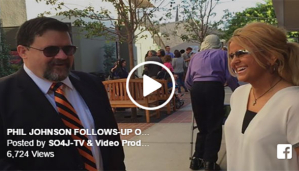I recently wrote about the young Scottish prophet who confronted Pastor John MacArthur with a word of correction. In addition to almost 200 article comments at the time of my writing this article, there has also been an unexpected wave of backlash on my Twitter and personal blogsite from the infamous Executive Director of Pastor MacArthur's Grace to You media ministry and his followers. This confrontation has raised several questions. I'll address them as best I can.
Who Said the Young Prophet was 'Self-Proclaimed'?
Most of the articles and many of the comments I've seen on this situation have declared that this man is a self-proclaimed prophet. Only, I'm not sure how this conclusion was drawn. After all, it's not as if one has papers to prove that they are a prophet as one does to prove their ability to drive or have car insurance. Unless we know the young man or his ministry personally, which I wager most of us do not, then we can only judge him by his words and his actions.
If He's a Prophet, Why Didn't He Quote Scripture?
This question, I find rather humourous. Most of the prophets in Scripture forth told what later became Scripture. It was confirmed, often unknowingly, by other prophets and by the New Testament as well, Jesus--the Word made flesh--often being the fulfillment of their prophecies.
Now just to be clear, no one can add to the canon of Scripture. It is perfect, complete as is. I'm simply making a point. I'm sure many a person accused Isaiah, Ezekiel, or Jeremiah of speaking erroneously because they said something that was not in the Pentateuch.
The point is that prophecy must align with Scripture. It need not necessarily be Scripture itself. Many times prophets will quote or paraphrase Scripture in their prophecies, but a prophecy is no more or less effective because it quotes or paraphrases Scripture. I believe the young prophet adhered to this.
I personally experienced the fruit of what the young prophet said, "you are sharpening the sword and they are cutting each other," as did the young prophet himself. Time and time again, words are likened to swords, daggers, and even fangs in Scripture.
The words of his mouth were smoother than butter, But war was in his heart; His words were softer than oil, Yet they were drawn swords. (Psalm 55:21)
Indeed, they belch with their mouth; Swords are in their lips; For they say, "Who hears?" (Psalm 59:7)
There is a generation whose teeth are like swords, And whose fangs are like knives, To devour the poor from off the earth, And the needy from among men. (Proverbs 30:14)
We also see time and time again in both Testaments the damage caused by those who spoke evil words against the prophets, apostles, and Jesus, causing division and strife.
John MacArthur's followers and their ring leader certainly gave new meaning to the words of the young prophet by demonstrating precisely what he warned against.
Where Is the Godly Grief?
To those who believe the young man was a false prophet at worst or misguided at best, I ask where was the godly grief displayed by John MacArthur, his leadership, and his congregation? This reaction is not seen in the video clip. I saw Pastor MacArthur smiling, cracking jokes, and discrediting the young man. I saw the people, both in the pulpit and congregation, laughing and scoffing as well. No one was in grief over what they perceived to be a young man in error. No one suggested praying for him. No one even had a perceived righteous indignation against the young man's actions. The only person who seemed grieved by a spirit of error present was the young prophet. See for yourself!
How Can You Judge a Prophecy If You Don't Believe in Modern-Day Prophets?
Simply put, you can’t. Bias, blindness, and hard-heartedness will always keep us from judging fairly that which we are biased against. They’ve put a wall up against the things of the Spirit and only the power of God can tear it down.
How Should We Judge Prophets & Their Ministry?
Ideally, a church would welcome and indulge in prophetic ministry and there would be at least a few seasoned ministers/prophets on hand in addition to the pastor who can judge whether or not a prophecy is truly of God as Paul stated in 1 Corinthians 14. But this was not an ideal situation. Thus, we must move to the next criteria: alignment with Scripture.
Pastor MacArthur and his congregation have obviously rejected the prophetic word. Yet we as the godly public can see if the message bears witness with the Spirit and Word of God. One will never contradict the other.
It is my firm belief that the vast majority of the time, prophecies should confirm whatever God has already been speaking to you. At the very least, the Holy Spirit in you should indicate to you immediately whether or not the word was, in fact, accurate.
I’ve found that very often when God speaks, you have an immediate response to do something, be it pray, plan, forgive, or in this case, repent before God and man for propagating erroneous teachings. But again, hard-heartedness can cloud one’s discernment.
It should be made clear though that simply not liking, being embarrassed by, being angry at, or even not (fully) understanding a word is not a reason to reject it. The Word of God is full of “hard sayings” that we may not like, but that does not make it any less accurate. In fact, that’s probably an indication of the opposite. Whatever message God is trying to get to us, however it comes, we should be open enough to His Spirit to be able to receive it. While our feelings are sketchy and often deceitful, the Spirit of Truth will never lead us astray.







